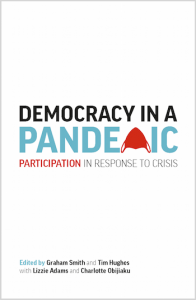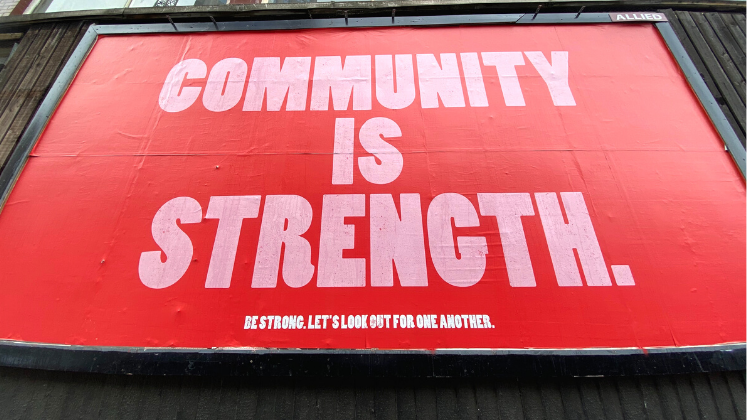In Democracy in a Pandemic – available open access – Graham Smith and Tim Hughes with Lizzie Adams and Charlotte Obijiaku explore the role that democratic participation and deliberation have played during the COVID-19 pandemic. This book not only offers valuable reflections on democracy and citizen action in a time of crisis and upheaval, but also serves as a wake-up call to question whether our traditional democratic mechanisms are sufficiently democratic at all, writes Theo Stone.
Democracy in a Pandemic: Participation in Response to Crisis. Graham Smith and Tim Hughes with Lizzie Adams and Charlotte Obijiaku (eds). University of Westminster Press. 2021.
 The COVID-19 pandemic has resulted in some of the most extensive and far-reaching forms of state intervention in decades in order to protect both the population and the health infrastructure behind it. The immediacy of restrictions on space and the significant financial interventions to prevent mass unemployment and the collapse of businesses have arrived from highly centralised political power, with participatory and deliberative forms of democracy ignored on the grounds that they would prevent swift and timely responses to the dangers created by the pandemic.
The COVID-19 pandemic has resulted in some of the most extensive and far-reaching forms of state intervention in decades in order to protect both the population and the health infrastructure behind it. The immediacy of restrictions on space and the significant financial interventions to prevent mass unemployment and the collapse of businesses have arrived from highly centralised political power, with participatory and deliberative forms of democracy ignored on the grounds that they would prevent swift and timely responses to the dangers created by the pandemic.
It is this tension that Democracy in a Pandemic: Participation in Response to Crisis seeks to address. As its editors Graham Smith, Tim Hughes, Lizzie Adams and Charlotte Obijiaku write collectively, the central concern of the book is that ‘government policy and decision-making by other institutions in the face of this unprecedented emergency has too often not reflected the diversity of lived reality, frequently making the situation worse for many social groups’ (3).
To respond to these concerns, the book assembles a series of 21 concise but timely reflections on the roles that participation and deliberation have played during the COVID-19 pandemic, whilst making a case for greater engagement with these issues beyond emergency contexts. Many of these essays were originally published as a blog series on the website of the participation charity Involve, in partnership with the University of Westminster’s Centre for the Study of Democracy, before the book’s open access publication in July 2021.

Image Credit: Photo by Gabriella Clare Marino on Unsplash
The book is divided into two parts. The first, ‘Voices from the Pandemic’, explores a variety of perspectives and experiences that reflect on participation and deliberation in a time of emergency and are published in the order they were written. Subjects range from calls for greater inclusivity of people with learning disabilities in policy development and research, to giving gig workers more say over their work conditions, to an exploration of how a lived experience of COVID-19 has made more visible the way society thinks – or fails to think – about criminal justice (77).
Time and inclusivity are the central themes within this section of the book. In ‘Participation on Whose Terms?’, Javier Sanchez-Rodriguez considers the impact of COVID-19 on people of refugee and migrant backgrounds and the barriers they face to effective democratic participation. Highlighting the expectation that refugees and people of migrant backgrounds are expected to participate in deliberations about their wellbeing and lives, Sanchez-Rodriguez expresses scepticism over the engagement and resources provided to empower and give agency to minority voices. He identifies this as leading to the representation of minority groups by a further minority of voices within these groups (79-81). Sanchez-Rodriguez positions these discriminatory practices as nemeses of participatory democracy, highlighting the failure to adequately renumerate these voices and the tendency to simply use a single member of these groups. This tokenises diversity as models of exploitation and disrespect, enabling testimonial injustices to take root (81).
As is recurrently mentioned in this section of the book, the lack of willingness of government bodies and agencies to embed participatory practices in emergencies minimises voice. The overlying conclusion is that communities should not only be included in the decision-making processes of strategies that affect them but should also determine the way they are included to ensure genuine democratic participation (82). Sanchez-Rodriguez’s chapter is particularly pertinent when considering the growing popularity of deliberative democratic methods in the UK – such as Citizens’ Assemblies on climate change – and provides substantive challenge to ensure best practice for future deliberative and participatory processes.
The second part of the book, ‘Lessons for Democracy’, consists of five specially commissioned essays to reflect on hearing diverse voices, mutual aid, participatory public authorities, democratic innovation around the world and the future of democracy. As Donna Hall, Simon Kaye and Charlotte Morgan write in ‘How the Pandemic has Accelerated the Shift towards Participatory Public Authorities’, forms of participation have blossomed through digital approaches, new networks and ‘co-productions’ between citizens and public services. As examples, they cite digital platforms such as the NHS ‘GoodSAM’ app and the Camden Health and Care Assembly, which engage citizens and develop new relationships between citizens and the state (143, 145).
The authors highlight the ‘Wigan Deal’ model as a key example, citing the use of an explicit social contract that describes a ‘more active relationship between the council and communities’ to ensure that both sides adopt new and different ways to create ‘a more balanced and participatory norm’ (149). The authors identify the success of the model as resting on the creation of meaningful dialogue between the council, local institutions and residents, with consultation processes accessing values and mindsets from the public to drive improvements (151).
Noting how the pandemic has incentivised the development of new participatory approaches, Hall, Kaye and Morgan further outline how economic and environmental resilience can be strengthened through this kind of hyperlocal thinking. They suggest this model as a way to create a ‘thicker kind of citizenship’ with a greater focus on localism and trust to build a less centralised and more collaborative democratic system (153). However, as with other chapters in this section, it is sometimes difficult to interpret how these participatory processes directly align with the COVID-19 pandemic, and how adopting them could have clearly improved how we responded to it. Above all, a greater focus on the role the Wigan Deal may have played in the COVID-19 pandemic would be welcome.
The concluding chapter, ‘A Manifesto for a Democracy in a Crisis’, written by editors Smith and Hughes, offers a communitarian approach to building a better world. They emphasise the need for cooperation and shared responsibility as a way to build out of the crises wrought by the pandemic, arguing for a deeper democratic response to future emergencies (184). Smith and Hughes thereby outline a five-point manifesto for change, providing brief endorsements for the establishment of mechanisms for ongoing public dialogue (185), investment in communities (186), tackling inequalities in society (188), involving citizens in shaping the future (189) and learning lessons from the COVID-19 crisis (190).
Through this lens, Smith and Hughes remain pessimistic about using a standard public enquiry to learn key lessons from the COVID-19 pandemic, instead urging greater accountability, semblances of closure, proper resourcing and full independence for broader learning (191). However, although this chapter provides a compelling narrative, details of an alternative, decentralised and more participatory form of enquiry would be welcome to demonstrate how these mechanisms can be achieved through a synthesis of the essays within the book. This is particularly important given the complexities and relative obscurity of participatory initiatives for many potential readers and the book’s previously expressed concerns over the centralisation of decision-making.
In conclusion, Democracy in a Pandemic: Participation in Response to Crisis provides an important and highly accessible contribution to understanding not just the state of democracy in the UK during the COVID-19 pandemic, but also how people and institutions are actively considering and building new networks and forms of democratic participation. The book should not only be read as a collective reflection on democracy and citizen action in a time of crisis and upheaval, but also as a wake-up call to question whether our traditional democratic mechanisms are sufficiently democratic at all.
Note: This review gives the views of the author, and not the position of the LSE Review of Books blog, or of the London School of Economics and Political Science.







